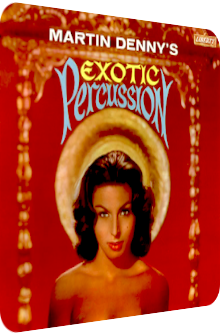
Martin Denny
Exotic Percussion
1961
In the 60’s, Exotica luminary and composing pianist Martin Denny (1911–2005) starts to experiment and broaden the scope even beyond the exciting epithelium called Exotica, but you wouldn’t presume – let alone know – any of this when listening to Exotic Percussion, the bandleader’s late entry into the percussion craze. Released in 1961 on the artist’s ever-reliant house label Liberty Records, spanning the usual 12 tracks – one of them a unique Denny production – and comprising of a richly equipped instrumental pool, Denny’s crimson-red album is a great addition to any collector’s abode, but no guiding light when it comes to the promise of its title.
The focus is definitely not set on percussion, nor is it poised to expose vivid drums. I wager that this album originally had a different title but that the marketing buffs of Liberty Records quickly renamed it in order to target the aforementioned and increasing market of percussion and bongo albums. This cloak-and-dagger title is one of the few negative things to attest, as Exotic Percussion is otherwise supercharged with scintillating melodies, great solos as well as interplay and, yes, a few percussive delights after all. The combo remains the same: Julius Wechter plays the vibraphone and marimba in tonal and percussive styles, August “Augie” Colón reprises his role as the drummer and birdcaller, Harvey Ragsdale plays the double bass plus a Caribbean marimbula and Martin Denny resides on his beloved piano and celesta. A new force to reckon with is dedicated percussionist Frank Kim. Its title notwithstanding: how does Exotic Percussion fare in hindsight, and which renditions are extraordinarily enchanting?
The most surprising entities within the opener are simultaneously the best documented allure of the genre: vivid birdcalls, here of the piercing, cavernous kind. The place to be is My Tane, originally composed by August Goupil, the omnipresent Johnny Noble and Richard Gump. It does not come as a surprise, however, that Martin Denny’s men decide to neglect the percussion segment of the album title and rather inject glacial vibes in tandem with the mellower sun-kissed marimba foils to the aureole. The glissando of the bandleader’s piano is aqueous both in major and minor, Augie Colón’s gently beaten bongos echo through Frank Kim’s whitewashed cymbal haze, there is a lot to digest despite the streamlined reticulation. And it has to be said: the array of reverb whets the appetite. And the adjacent Cumana delivers. Written by Barclay Allen, Harold Spina and Roc Hillman, the fast-paced locale is akin to a psychedelic glitter arcanum supercharged with Flamenco timbres realized via vibes and marimbas, Latin piano sparks and a flowing cascade of punctilio cowbells and timbales. The dun-colored tonality remains strong, though the saccharified luminosity of the – now all the more audible – percussion is as eminent a force.
After a Chinese gong stops the coruscating chromaticity, Softly, As In A Morning Sunrise by Oscar Hammerstein II and Sigmund Romberg comes into play. Not one’s archetypal Exotica classic, the band is up for challenge and transfigures the string-heavy arrangement of the original into a plinking sapphire grove with a magnanimous amount of silence that boosts the quality of the textures. The concho shells rattle like snakes, birds fly around, a real koto roulettes the mélange of fir-green alto flutes, Augie Colón’s bongo coppices and Harvey Ragsdale’s benthic double bass. This is dark and remote Exotica alright! Up next is an original track written by Martin Denny. The uplifting Day Delight is equally ablaze with a scintillating granuloma of clanging cowbells, triangle dots and wintery orchestra bells, but it is the intermixture of the rugged clarinet superfluids and towering euphony of the aureate piano chords that make it a rather eclectic, though ultimately accessible sparkler to cherish.
After this diaphanous flowerage follows the nocturnal counterpoint in the shape of Chester Wallace’s and Sherman Myers’ Moonlight On The Ganges, a classic that has been featured on many a genre album, be it Axel Stordahl’s Jasmin & Jade or Bob Florence’s Bongos / Reeds / Brass (both 1960). Denny’s version is keen on the double bass frame that runs like a glaucous rivulet through the wonderfully ghostly vibraphone/piano team-up. Almost drowning in the reverb of the Ganges, the spectral nebula is harmless enough to enchant amidst the quavering tambourines before Ray Noble’s Cherokee (Indian Love Song) ends side A with a smoking-fast ride through woodpecker marimba jungle paths, classic drum hydrazines and caproic oompah rhythms complete with polyfoil piano prongs and collapsing congas.
Side B leaves the quasi-tachycardia behind for a moment when Denny’s band comes up with Nicholas Roubanis’ Exotica milestone called Misirlou/Miserlou. Its Oriental-Greek serration usually makes for a listening experience that is both murky and majestic, and granted, this is what is presented here as well, but the viridian alto flute and the piano’s golden luminescence illuminate the jungle enough. It is indeed a jungle rather than a desert, as Augie Colón’s battery of birdcalls suggests a verdured scenery far away from saffron wastelands. With the following beauty called Anna, written by Francesco Giordano and Roman Vatro, the quartet ventures into lands that are usually considered by Xavier Cugat and Pérez Prado. The Rimini-esque realization of Anna’s world-famous main melody however is wonderfully realized when the marimba and piano conflate into a cajoling sunburst that glows in-between the bongo decortication and vitreous cowbell fusillade.
While Rube Bloom’s Song Of The Bayou is a midtempo peritoneum filled with Latin wisps à la trembling jungle fifes, rubicund piano sequences and superbly phantasmal pipe organ quiltings, Friedrich Hollaender’s and Leo Robin’s Moonlight And Shadows sees its vanillarific aura improved by a moiré of pointillistic drops and various percussion instruments. Chinese legato gongs and retrojected flute washes round off the moony locale. My Shawl by Pedro Berrios, Stanley Adams and Xavier Cugat then sees its physiognomy augmented by the iridescent depth of Julius Wechter’s marimba, the raspy guiro cataracts and sumptuous piano chords before The Girlfriend Of The Whirling Dervish by Al Dubin, Harry Warren and Johnny Mercer serves as the strikingly Oriental finisher. Denny and his tribe shuttle between timpani-interpolated marimba rotations, Middle Eastern flute thiazides and a piano-based show tune aurora of the Westernmost kind, making this a feast of textures and cleverly arranged segues that ends with a beloved cliché: a Chinese gong.
Exotic Percussion is one of Martin Denny’s great albums, surprisingly cohesive, stringently focused on the textures at hand, only marginally branching out into unexpected directions and occasionally willed to include unexpected instruments – such as the koto on Softly, As In A Morning Sunrise – in the vivacious sceneries. That it isn’t hailed as a true classic is due to the fact that Martin Denny has delivered so many of them in the 50’s already, and of course because the Exotica genre has well matured in 1961, having reached its peak in popularity in the same year. The amount of added reverb may seem questionable at first, especially so since Martin Denny’s records are so keen on delivering a life-like performance complete with scintillating vibes and punchy double bass, but the echoey soundscape never deters from the arrangements themselves. These remain top-notch and evoke a plasticity that is still audible after decades.
Having said that, there is something questionable about this LP, or better still, it is the lack thereof that is dubious: the promised percussion. The drum and percussion section is well-equipped, congas, bongos, timbales, guiros, gongs and whatnot are on board, but this is obviously the case with any of Martin Denny’s exotic albums! What the album title probably hints at is Julius Wechter’s use of the marimba as a percussive device, playing it in a saltatory and wildly energetic manner, spawning helical gunfire eruptions which, on both the molecular and tonal level, spawn melodies and euphonious accompaniments as a side effect. While it is true that mallet instruments can be used as percussion devices instead of serving as main ingredients that constitute the melody, this observation is yet again only partially true in case of Martin Denny’s Exotic Percussion whose various areas prosper equally well. My advice to you and myself at the end of the day: forget about the meaning of the title, enjoy the infrequent pentatonicism and palatable exoticism, and you can only win. Exotic Percussion is available on vinyl, remastered download versions and on streaming services.
Exotica Review 400: Martin Denny – Exotic Percussion (1961). Originally published on Dec. 20, 2014 at AmbientExotica.com.
